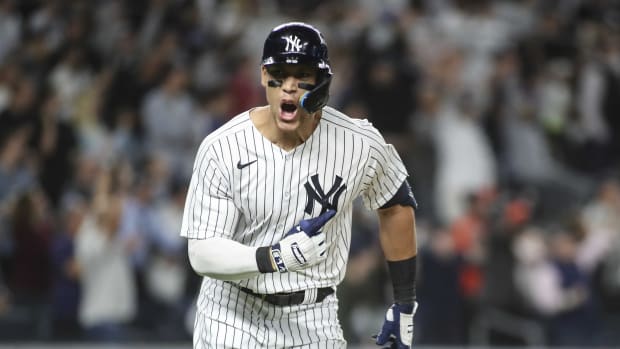Aaron Judge’s Big Bet Pays Off—and Then Some
The biggest free agent of the winter is off the market: Aaron Judge will reportedly stay with the Yankees for the rest of his career.
The nine-year, $360-million deal is the most expensive in the history of MLB free agency. It comes after months of intrigue and kicked off the third day of winter meetings with a bang. (It also comes roughly 15 hours after one high-profile rumor that the slugger was all but already on his way to the Giants and set the hot stove ablaze.) Judge has spent his entire career with the Yankees. He’s gone with the club from first-round draft pick in 2013 to Rookie of the Year in ’17 to AL MVP in ’22. Yet he’d turned down previous opportunities to stay in New York, including a seven-year, $213.5-million extension offer shared publicly by the team just before Opening Day. Instead, Judge bet on himself, and he decided to test the open market of free agency after the season.

He made sure it ended up worth his while. Judge put together one of the most remarkable performances ever by a hitter, and in turn, he used that to improve on the Yankees’ extension offer by two years and more than $140 million. He reportedly weighed offers from the Giants and Padres. But instead, in the end, he decided to stay put. The deal ensures the cornerstone of the Yankees’ offense will remain in New York. And it gives Judge another claim on history in the form of a record-setting contract—a bet on himself that paid off.
There’s not much to say about Judge’s talent as a slugger that hasn’t already been said. He’s fresh off a historic season in which he hit 62 home runs, earning him the American League single-season record and making him the first player in two decades to hit more than 60. This was, of course, the best season of his career so far. (As would be the case for just about anyone.) But Judge has a remarkable track record of consistency: He’s never had a bad season. He’s never even really had a mediocre one. At his absolute worst, hampered by an oblique strain in 2019, he still posted a .921 OPS (143 OPS+) and played in 102 games. The only player who has hit better since Judge exhausted his rookie eligibility in ’17 is Mike Trout. (Judge has a 166 OPS+ in that time frame to Trout’s 185.) In other words, Judge had established himself as one of the premier sluggers in the game well before ’22. Even if you assume he will never repeat what he did last season—though, given his talent, he very well might come close!—it stands to reason that he still has years ahead as one of the best hitters in the game. And don’t limit your judgment of his game to his bat. Judge is a capable defender, too, and while he should return to his original position of right field going forward, where he grades out as elite, he more than held his own in center last season.
A deal this size always comes with a few question marks. There’s his age—he’ll be 31 in April—and the potential health concerns that accompany his size. Judge is 6’7”; there is naturally some apprehension about how his body might hold up long-term. Though he’s coming off two consecutive seasons of good health, his early career was dotted with injuries, particularly soft-tissue ones. The list of sluggers his size who have been able to maintain success well into their 30s includes Dave Kingman, Frank Howard, Dave Winfield and … that’s about it. But it’s worth noting that it’s tricky to make substantive comparisons here. If there’s generally a poor record of hitters this big holding up beyond their early 30s, well, there’s almost no record at all of one as physically gifted of an athlete as Judge, playing with all the benefits of a modern training staff. That doesn’t guarantee health. (Far from it.) But it does make it more complicated to assume a physical breakdown is imminent here. And no team should be as familiar with the ins and outs of his health record as the Yankees, which clearly felt comfortable paying up to retain him, anyway.
For the Yankees, their immediate future now looks far brighter than it would have otherwise. Had the slugger walked, they would have needed to spend their offseason trying to replace him. Instead, they can now focus on other needs, like adding some pitching depth. Judge has made six consecutive playoff appearances with the Yankees—but he has never had a chance to play in the World Series. They’ll surely hope to do their best to change that in the first few years of this deal.
Judge bet on himself last spring when he turned down that final extension offer from the Yankees. He’s now made sure that bet paid off—and then some.
